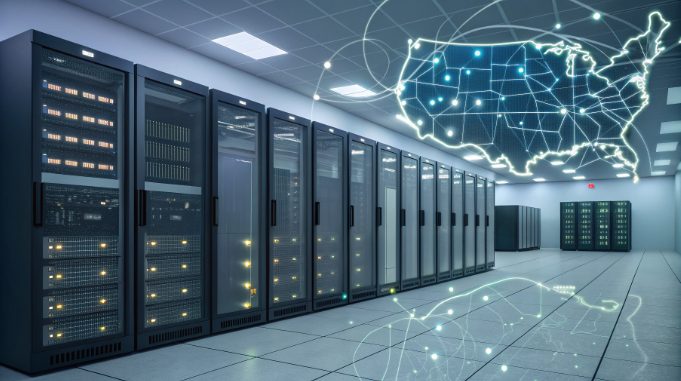How US Servers Ensure Secure and Efficient Data Transmission

In today’s interconnected digital landscape, US servers stand at the forefront of ensuring secure and efficient data transmission across the global internet infrastructure. The robust combination of advanced hardware configurations, sophisticated security protocols, and optimized network architecture makes US hosting solutions a cornerstone of modern web operations.
Infrastructure Excellence: The Foundation of US Server Capabilities
The superiority of US server infrastructure stems from its strategic implementation of cutting-edge technologies and methodologies. This foundation is built upon several crucial elements:
- High-performance network backbone nodes strategically positioned across major metropolitan areas
- State-of-the-art data center facilities equipped with redundant power systems
- Multiple tier-1 bandwidth providers ensuring optimal connectivity
- Geographically distributed server clusters for enhanced reliability
Comprehensive Security Architecture
The security framework of US servers encompasses multiple layers of protection, combining both physical and digital safeguards:
- Physical Security Measures:
- 24/7 surveillance systems with biometric access controls
- Advanced fire suppression systems
- Environmental monitoring and control systems
- Multiple redundant power sources with UPS backup
- Network Security Protocols:
- Enterprise-grade firewall protection
- Advanced DDoS mitigation systems
- Real-time threat detection and response
- Regular security audits and penetration testing
Network Optimization Technologies
The efficiency of data transmission relies heavily on sophisticated network optimization techniques deployed across US server infrastructure:
- Content Delivery Network (CDN) Implementation:
- Edge caching for faster content delivery
- Dynamic resource optimization
- Intelligent routing algorithms
- Auto-scaling capabilities based on traffic patterns
Modern US hosting facilities employ advanced load balancing mechanisms that significantly enhance data transmission efficiency:
- Smart Traffic Distribution:
- Round-robin DNS implementation
- Layer 7 load balancing
- Geographic-based routing optimization
- Health monitoring and automatic failover
- Bandwidth Management:
- QoS (Quality of Service) implementations
- Traffic shaping algorithms
- Bandwidth allocation controls
- Peak load management systems
Data Security Implementation
US servers implement comprehensive data security measures that extend beyond basic protection:
- Encryption Protocols:
- AES-256 encryption for stored data
- TLS 1.3 for data in transit
- End-to-end encryption options
- Hardware Security Module (HSM) integration
- Access Control Systems:
- Role-based access control (RBAC)
- Multi-factor authentication (MFA)
- IP-based access restrictions
- Audit logging and monitoring
Service Quality Assurance Protocols
US colocation facilities maintain rigorous service quality standards through systematic protocols and monitoring systems:
- 24/7 Technical Support Infrastructure:
- Dedicated NOC (Network Operations Center) teams
- Automated monitoring systems
- Incident response protocols
- Proactive maintenance scheduling
The implementation of comprehensive SLA (Service Level Agreement) frameworks ensures consistent performance metrics:
- Performance Monitoring:
- Real-time network performance analysis
- Resource utilization tracking
- Latency monitoring and optimization
- Bandwidth consumption analytics
- Maintenance Protocols:
- Scheduled hardware updates
- Software patch management
- Security vulnerability assessments
- Backup system verification
Competitive Advantages of US Server Infrastructure
The strategic advantages of utilizing US hosting solutions extend beyond basic infrastructure capabilities:
- Technical Excellence:
- High-performance computing capabilities
- Scalable architecture designs
- Advanced virtualization technologies
- Robust disaster recovery systems
- Operational Benefits:
- Cost-effective resource allocation
- Flexible deployment options
- Enhanced regulatory compliance
- Comprehensive technical support
Future Trends and Developments
The evolution of US server infrastructure continues to advance with emerging technologies and methodologies:
- Next-Generation Technologies:
- Edge computing integration
- AI-powered network optimization
- Quantum-safe encryption preparation
- Green data center initiatives
Conclusion and Recommendations
US servers continue to lead the global hosting industry through their commitment to security, efficiency, and technological innovation. The comprehensive integration of advanced security protocols, optimized network architecture, and robust infrastructure creates an environment where data transmission remains both secure and efficient.
For organizations seeking reliable hosting solutions, US servers offer several key considerations:
- Strategic Implementation Guidelines:
- Assess specific security requirements
- Evaluate bandwidth needs and scaling potential
- Consider geographical distribution requirements
- Review compliance and regulatory needs
The landscape of data transmission security and efficiency continues to evolve, with US hosting providers maintaining their position at the forefront of technological advancement and security implementation. Through continued investment in infrastructure, security protocols, and optimization technologies, US servers ensure that organizations can confidently deploy and maintain their digital presence while meeting the growing demands of modern internet operations.
Understanding these comprehensive security measures and efficiency protocols is crucial for tech professionals looking to leverage US server infrastructure for their hosting and colocation needs. The robust combination of physical security, network optimization, and advanced data protection makes US servers an optimal choice for organizations prioritizing secure and efficient data transmission.

